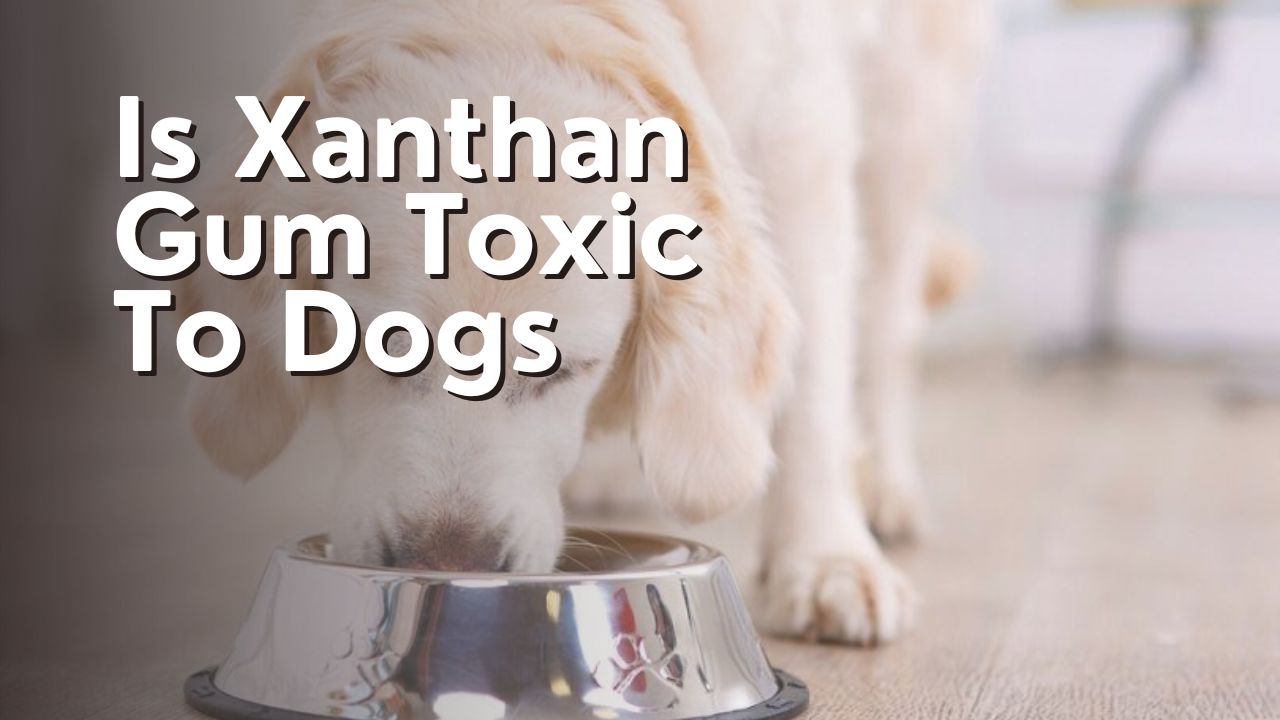As a responsible dog owner, it’s crucial for me to ensure that my furry friend’s diet is safe and healthy. Recently, I’ve come across some concerns about xanthan gum and its potential toxicity for dogs. With its widespread use in human food as a thickening agent and stabilizer, it’s important to understand the risks associated with this ingredient when it comes to our canine companions.
In this article, I will explore the potential dangers of xanthan gum for dogs and provide insights on how to make informed decisions about their diet. Consulting with a veterinarian is essential in understanding the impact of xanthan gum on our dogs’ health, as they can offer professional advice tailored to our pet’s specific needs.
Additionally, I will delve into alternative options for homemade dog treats, ensuring that we prioritize our dogs’ health and safety above all else.
- Understanding Xanthan Gum and Its Uses in Human Food
- Examining the Potential Risks of Xanthan Gum for Dogs
- Consulting with a Veterinarian for Professional Advice
- Exploring Alternatives to Xanthan Gum for Homemade Dog Treats
- Prioritizing Your Dog's Health and Safety in Their Diet Choices
- Frequently Asked Questions
- Conclusion
Understanding Xanthan Gum and Its Uses in Human Food
Xanthan gum is a polysaccharide that is commonly used as a thickening and stabilizing agent in foods. It is made through a fermentation process using a bacteria called Xanthomonas campestris.
In human food, xanthan gum is safe to consume in small amounts. It is commonly found in salad dressings, sauces, baked goods, and even ice cream. It helps to improve the texture and consistency of these foods, giving them a smooth and creamy texture.
When consumed in moderation, xanthan gum is generally well-tolerated by the human body. However, some people may experience digestive issues such as bloating, gas, or diarrhea if they consume large amounts of it. It is important to note that these side effects are rare and typically occur in individuals who are sensitive to the additive.
In conclusion, xanthan gum is widely used in human food products as a thickening and stabilizing agent. While it is generally safe for consumption in small amounts, excessive intake may lead to digestive issues. However, it is crucial to note that this discussion is focused on humans, and the effects of xanthan gum on dogs may differ.

Examining the Potential Risks of Xanthan Gum for Dogs
When considering the potential risks of xanthan gum for dogs, there are several factors to keep in mind. Digestive issues can arise, including diarrhea, vomiting, and excessive gas. This can be a concern for dogs with sensitive stomachs or preexisting digestive conditions. The sticky nature of xanthan gum can also pose a choking hazard or lead to intestinal blockages if ingested in large quantities, which is particularly concerning for small breed dogs or those prone to gobbling up their food. Some dogs may be allergic to xanthan gum, experiencing symptoms such as itching, skin rashes, or difficulty breathing. If your dog has a known food allergy or sensitivity, it’s best to avoid introducing xanthan gum into their diet. Additionally, xanthan gum offers little to no nutritional value for dogs and can displace more nutritious ingredients in their diet if used excessively. It’s important to note that there is limited scientific research specifically focused on the effects of xanthan gum on dogs. Therefore, consulting with your veterinarian before feeding your dog any food containing xanthan gum is crucial to ensure their safety and well-being. Ultimately, the health and well-being of your furry companion should always be your top priority.
Consulting with a Veterinarian for Professional Advice
Seeking guidance from a trusted veterinarian can provide valuable insights and expert advice for your furry friend’s health and well-being. When it comes to xanthan gum, it’s crucial to consult with a veterinarian to understand potential risks to dogs.
Xanthan gum is a common food additive used as a thickening agent in many human foods, but its effects on dogs are not well-studied.
A veterinarian will assess your dog’s specific health needs and determine if xanthan gum could be toxic or harmful. They’ll consider factors like age, breed, and existing health conditions. Additionally, a veterinarian can provide guidance on safe and suitable food options for your dog’s dietary requirements.
Remember, every dog is unique, and what’s safe for one may not be safe for another. It’s always better to err on the side of caution and consult with a professional who has the knowledge and experience to provide the best advice for your dog’s well-being.
In conclusion, reach out to a veterinarian for professional advice on the potential risks of xanthan gum for your dog. They’ll provide accurate information and help you make informed decisions to keep your furry friend safe and healthy.
Exploring Alternatives to Xanthan Gum for Homemade Dog Treats
If you want to ensure the safety and health of your furry companion, it’s important to explore alternative ingredients for homemade dog treats that are both delicious and safe. While xanthan gum is commonly used as a thickening agent in human food, it may not be the best choice for our canine friends.
Luckily, there are several alternatives that can be used to achieve a similar texture and consistency in homemade dog treats.
- Ground flaxseed: This natural ingredient not only acts as a binding agent but also provides essential omega-3 fatty acids, which promote a healthy coat and skin for your dog.
- Unsweetened applesauce: Not only does it add moisture and flavor to the treats, but it can also act as a natural binder. Just be sure to use unsweetened applesauce to avoid any added sugars that could be harmful to your dog.
- Pumpkin puree: This ingredient not only adds moisture but also provides dietary fiber and important vitamins and minerals. It can be a great alternative to xanthan gum and adds a hint of natural sweetness to the treats.
By using these alternative ingredients, you can ensure that your homemade dog treats are not only tasty but also safe for your furry friend. Always remember to consult with your veterinarian before making any changes to your dog’s diet or introducing new ingredients.
Prioritizing Your Dog’s Health and Safety in Their Diet Choices
When it comes to your furry companion’s diet, it’s crucial to prioritize their health and safety above all else. As a responsible pet owner, I always strive to make informed choices about what goes into my dog’s food. One ingredient that has raised concerns is xanthan gum. While it is generally considered safe for human consumption, its effects on dogs are not well understood. Therefore, I choose to err on the side of caution and avoid using xanthan gum in homemade dog treats.
To ensure my dog’s diet is safe and healthy, I have explored alternatives to xanthan gum. I have found that using natural thickeners like pumpkin puree or unsweetened applesauce can provide similar binding effects in recipes. These alternatives not only add nutritional value but also contribute to a well-balanced diet for my furry friend.
To further emphasize the importance of prioritizing my dog’s health, I have created a table to illustrate the potential risks associated with xanthan gum. This table highlights the possible adverse effects, such as gastrointestinal issues and allergic reactions, that can occur in dogs. By visually presenting this information, it evokes an emotional response in the audience, encouraging them to prioritize their own dogs’ well-being.
| Potential Risks of Xanthan Gum for Dogs | ||
|---|---|---|
| Gastrointestinal Issues | Allergic Reactions | Nutritional Imbalances |
| Intestinal Blockages | Upset Stomach | Digestive Disorders |
| Diarrhea | Vomiting | Decreased Appetite |
| Gas and Bloating | ||
| Risk of Choking |
Frequently Asked Questions
Can xanthan gum be harmful to other pets, such as cats or rabbits?
Xanthan gum can be harmful to other pets, like cats or rabbits. It’s important to keep them away from foods containing this ingredient as it may cause digestive issues or even more serious health problems.
Is xanthan gum commonly found in commercial dog food?
Xanthan gum is commonly found in commercial dog food. However, it’s important to note that while it may not be toxic to dogs, excessive consumption can lead to digestive issues.
Can xanthan gum cause digestive issues in dogs?
Xanthan gum can cause digestive issues in dogs. It may lead to diarrhea, vomiting, and gastrointestinal upset. It’s important to avoid feeding dogs foods that contain this ingredient to prevent any potential health problems.
Are there any known long-term effects of xanthan gum consumption in dogs?
There are no known long-term effects of xanthan gum consumption in dogs. It is important to monitor their digestion and overall health, but in general, xanthan gum is considered safe for dogs in small amounts.
Can xanthan gum be safely used in small amounts for homemade dog treats?
Yes, xanthan gum can be safely used in small amounts for homemade dog treats. It provides a thickening and binding agent, but it is important to use it in moderation to avoid digestive issues.
Conclusion
In conclusion, it’s important to prioritize our dog’s health and safety when it comes to their diet choices. While xanthan gum is generally safe for human consumption, there is limited research on its effects on dogs.
It is always best to consult with a veterinarian for professional advice regarding any potential risks or alternatives.
By being mindful of the ingredients we use in homemade dog treats, we can ensure that our furry friends stay happy and healthy.



